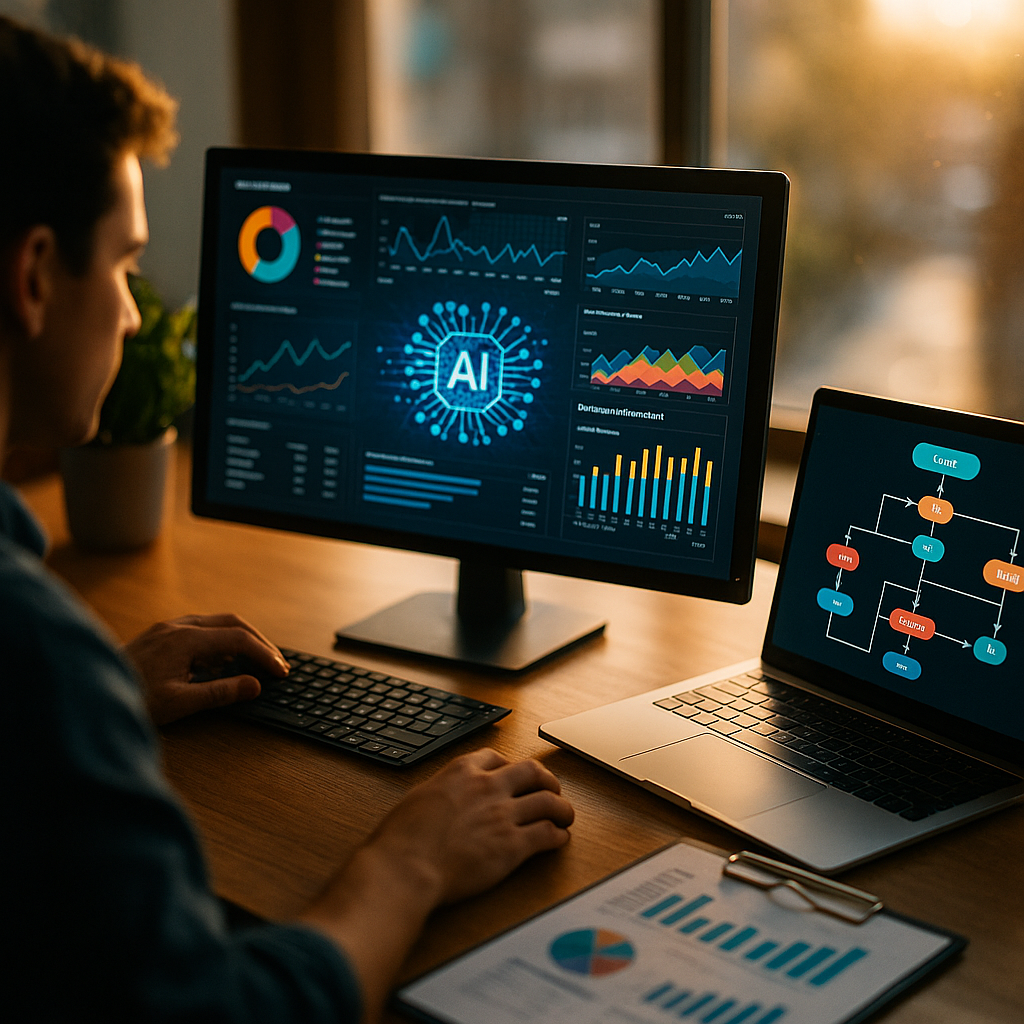Advanced AI workflows for marketing teams are swiftly transforming how businesses strategize, execute, and optimize their campaigns. By leveraging cutting-edge tools and automation, marketers can drive efficiency, boost ROI, and gain actionable insights. Ready to discover how AI can redefine your team’s marketing potential? Explore the proven tactics and workflows shaping successful marketing teams in 2025.
How AI Automation Streamlines Marketing Campaigns
AI-powered automation is at the core of modern marketing operations, helping teams manage complex campaigns with precision. Today’s tools use machine learning to segment audiences, personalize messaging, and time communications for maximum impact. According to Statista, 83% of marketing leaders now utilize automation for routine tasks, freeing creative teams to focus on strategy and innovation.
Advanced AI workflows automate processes such as:
- Lead scoring and nurturing based on behavioral data
- Dynamic email content creation and distribution
- Real-time ad optimization across multiple platforms
- Automated social media posting and sentiment analysis
Integrating these automations creates a unified, agile approach to campaign management, reducing errors and boosting productivity.
Enhancing Content Creation with Generative AI Tools
Generative AI is reshaping how marketing teams develop and deploy content. These tools, trained on vast datasets, can draft copy, design visuals, and even help outline video scripts tailored to desired audiences. In 2025, AI content tools such as ChatGPT Enterprise and Jasper are used by over 60% of top-performing teams, according to a MarTech survey.
Key benefits for marketers include:
- Accelerated content production with AI-assisted drafts
- Personalized blog posts, product descriptions, and ad copy
- Rapid A/B testing of messaging for optimized conversion
- Brand guideline checks and tone enforcement using AI models
AI can suggest improvements to headlines, identify trending topics, and ensure SEO consistency across all campaign materials. This empowers content teams to stay ahead in fast-paced digital landscapes.
Optimizing Customer Journeys Using Predictive Analytics
Predictive analytics powered by AI is a game-changer for mapping and optimizing the customer journey. By analyzing historical and real-time user data, AI can forecast behaviors, predict lifecycles, and suggest the best interventions to maximize customer value.
For marketing teams, predictive models:
- Anticipate when leads are likely to convert
- Identify churn risks and suggest retention strategies
- Calculate customer lifetime value (CLV) for targeted campaigns
- Recommend upsell and cross-sell opportunities
According to Forrester, firms employing predictive AI in their workflows saw a 28% increase in marketing campaign ROI in 2025. These insights guide marketing teams to deliver the right message at precisely the right moment on the right channel.
Collaborative AI Workflows for Cross-Functional Teams
Advanced AI workflows don’t operate in silos; their real power comes from collaboration tools that connect marketing with sales, product, and analytics teams. Platforms like HubSpot and Salesforce integrate AI functionalities that allow seamless data sharing, campaign tracking, and performance reporting across departments.
Key collaborative AI features include:
- Project management tools with AI-powered prioritization
- Automated reporting dashboards for all stakeholders
- AI-assisted brainstorming and creative suggestion modules
- Real-time document sharing with version control
This interconnected approach eliminates bottlenecks, ensures transparency, and allows teams to quickly pivot strategies based on unified data insights.
Ethical Considerations and Data Privacy in AI Marketing
As AI becomes more entrenched in marketing, ethical considerations and data privacy remain top priorities in 2025. Marketers must comply with evolving regulations and safeguard customer trust. Responsible AI workflows start with transparent data practices, ongoing model audits, and robust consent mechanisms.
Best EEAT-compliant practices for ethical AI marketing include:
- Clear disclosure of AI-generated content
- Regular review and de-biasing of AI algorithms
- Implementing opt-in/opt-out options for personalized targeting
- Adherence to GDPR, CCPA, and local data protection laws
Building trust through ethical AI use not only minimizes regulatory risks but also strengthens brand reputation and customer loyalty.
Scaling AI-Driven Marketing Workflows for Future Growth
Scalability is essential for marketing teams adapting to rapidly shifting markets. The latest AI platforms are cloud-native, API-driven, and designed for integration with emerging technologies—ensuring that teams can scale their workflows to accommodate increasing data volumes and campaign complexities.
For successful scaling, teams should:
- Choose modular AI platforms with customizable workflows
- Invest in upskilling to align human expertise with AI capabilities
- Monitor performance metrics and adjust workflows iteratively
- Foster a culture of experimentation and innovation
By future-proofing workflows with scalable AI, marketing teams can confidently pursue growth and sustain a competitive edge.
FAQs About Advanced AI Workflows For Marketing Teams
-
What are the main benefits of using advanced AI in marketing workflows?
Advanced AI enables faster campaign execution, improved targeting, efficient content creation, accurate performance analytics, and better ROI tracking through predictive and generative capabilities.
-
How can marketing teams ensure ethical use of AI?
Adopt transparent data practices, disclose AI-generated content, review AI algorithms for bias, and comply with all data protection regulations to maintain customer trust and regulatory compliance.
-
Is AI capable of replacing creative roles in marketing?
No. While AI can assist with creative processes and reduce repetitive tasks, human insight and innovation remain essential. AI augments creativity rather than replacing it.
-
Which business sizes benefit most from AI marketing automation?
Both small and large teams benefit, but scalability features in 2025 platforms ensure that even startups can implement enterprise-grade automation as they grow.
-
How should teams start implementing advanced AI workflows?
Begin by identifying high-impact areas for automation, pilot AI tools on select campaigns, invest in staff training, and use performance data to iterate and expand adoption across workflows.
In summary, advanced AI workflows empower marketing teams to achieve greater efficiency, agility, and impact across every campaign. By harnessing automation, predictive analytics, and responsible data practices, marketers can thrive in 2025’s dynamic landscape. Invest now to unlock your marketing team’s true potential.
